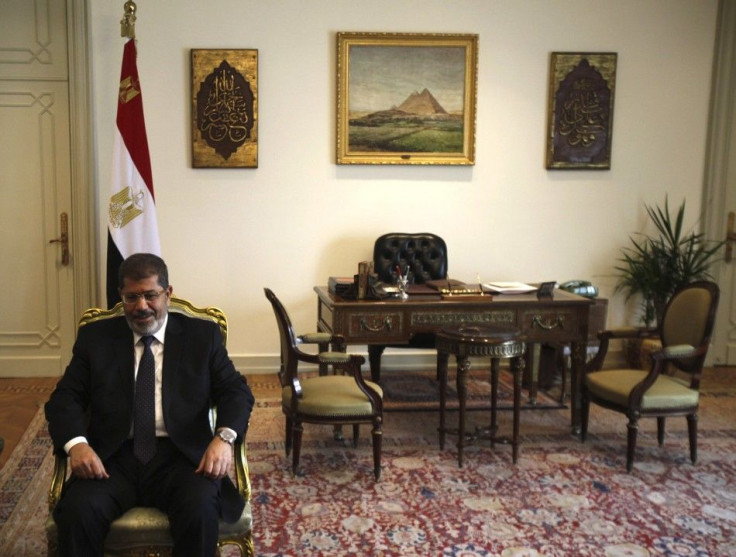Egypt’s Ultimatum: As Protests Rage, What Are Morsi’s Options?
As Protests Rage, What Are Morsi’s Options?

Confusion reigns in Egypt as the clock ticks down for embattled President Mohammed Morsi. On Monday, the national military issued an ultimatum: if Morsi cannot negotiate a solution with the opposition by Wednesday, the armed forces will step in with a so-called “road map” of their own.
At least 16 people have died and hundreds more have been injured since June 30, when anti-Morsi demonstrators took to the streets of Cairo calling for the president to step down. The Islamist policies favored by the ruling Freedom and Justice Party, a branch of Muslim Brotherhood, have angered those Egyptians who had wanted a more inclusive and progressive society after the Arab Spring ouster of Hosni Mubarak.
An economic crisis has engendered further impatience with the administration; Egyptians are struggling amid soaring inflation, high unemployment, and dire shortages of fuel.
Morsi rejected the military’s ultimatum in a statement delivered during the predawn hours of Tuesday morning , noting that he would stick to the “path that has been outlined.” But his critics are wondering what path that is – in the midst of a public uproar, what options does the president have?
At this point, it is unlikely that the uprising will die down and allow Morsi to continue with governance as usual; demonstrators have pledged to persist until the president steps down. Millions have taken to the streets so far, and opposition activists say 22 million people signed a petition calling for Morsi’s ouster -- quite a significant bloc in a country of about 85 million, though the figure has not been verified.
Nonetheless, Morsi has one very legitimate reason not to step down immediately: He was fairly elected by the people of Egypt in mid-2012. The people of Cairo and several other cities along the Nile – the same people who were largely responsible for the 2011 protests against Mubarak – voted for Morsi’s closest challenger Ahmed Shafik during the runoff presidential poll in June 2012, but most of the Egyptian electorate favored the Islamist candidate.
The president has since lost much of his public support due to the ongoing economic crisis, a seizure of extra-judicial power in 2012, and his government’s mishandling of the constitutional drafting process. Morsi may yet retain enough legitimacy to keep his post temporarily, perhaps by forming a new government or agreeing to a new presidential election in the coming months. But the president’s room to maneuver is shrinking fast; several of his own ministers have been resigning over the past 24 hours, including Egyptian Foreign Minister Mohammed Kamel Amr.
Morsi could also capitulate entirely to the military, which may take control of the country if its ultimatum is not accepted. The army has pledged not to govern the country, and many of the protesters have accepted their intervention as an expedient way to bring down the administration. But plenty of suspicion persists, since the armed forces have a history of interfering in politics and committing human rights abuses against civilians.
If the army keeps its promise not to stage a coup of its own, it could act as a steward for the empowerment of anti-Morsi groups, most of which are untied under an umbrella bloc called the National Salvation Front, led by Nobel Peace Prize winner Mohamed el-Baradei. This might lead to a transitional power-sharing government, giving the opposition time to regroup politically ahead of new elections.
Another option would see the Muslim Brotherhood cut its losses by supporting Morsi’s step-down, which might be a smart move for an organization whose image has been tarnished by Egypt’s post-revolution crises. That might enable another Freedom and Justice Party candidate to enter into a new election when the time comes.
No matter what happens when the ultimatum reaches its deadline on Wednesday evening, only one thing is certain: there will be no easy or simple transition. Morsi’s tenure as president may come to an end soon, but that will leave Egypt’s most intractable problems to the next leader of a country in turmoil.
© Copyright IBTimes 2024. All rights reserved.












